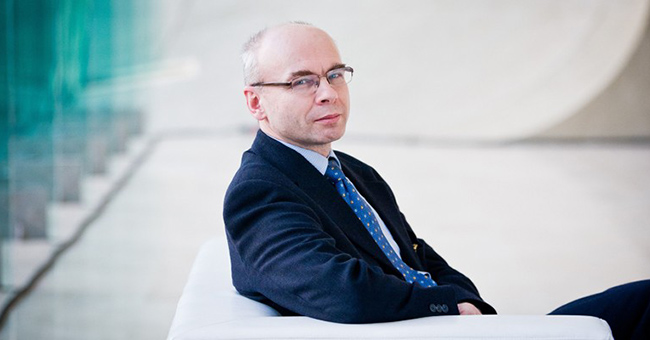
Dariusz Stola, recipient of 2020 Irena Sendler Memorial Award
MAY 12, 2020, SAN FRANCISCO — Taube Philanthropies has named the former director of the POLIN Museum of the History of Polish Jews as the recipient of its 2020 Irena Sendler Memorial Award. Acclaimed historian Dariusz Stola is being honored for his visionary leadership of POLIN Museum, a sophisticated and complex world-class public institution, whose overnight success had been lauded and honored throughout Prof. Stola’s tenure, from March 2014 to February 2019.
The Taube Philanthropies’ 2020 Irena Sendler Memorial Award, named for the Polish social worker who saved hundreds of Jewish children from the Warsaw ghetto during the Nazi occupation, was announced on Tuesday, May 12th, marking the twelfth anniversary of Irena Sendler’s death.
Prof. Dariusz Stola is a historian of Poland under Communism, the Holocaust, Polish-Jewish relations, social memory, and international migrations in the 20th century. In 2013, he was awarded the Knight's Cross of the Order of Polonia Restituta for his research on the legacy of the March 1968 political crisis in communist Poland. Author and editor of more than 100 articles and nine books, Prof. Stola was plucked from the ivory tower of academia by the Minister of Culture and National Heritage Bogdan Zdrójewski in early 2014 to head the POLIN Museum and oversee the museum’s grand opening in October 2014. Having honed his managerial and administrative skills in senior positions at his former university, Prof. Stola became recognized as one of Gazeta Wyborcza’s “Persons of the Year,” in the category of culture, for his distinguished leadership of POLIN Museum.
“Dariusz Stola is the most outstanding scholar and museum director we could ever hope to have lead the new museum in its first five years, which is a critical time for any major cultural institution. He has been responsible for all of POLIN’s stellar achievements, at every conceivable level,” said Tad Taube, Chairman of Taube Philanthropies and Honorary Consul for the Republic of Poland in San Francisco. “Through the Irena Sendler Award, Taube Philanthropies expresses our deep appreciation and friendship. We look forward to an ongoing partnership with him.”
Since it opened in 2013, the POLIN Museum has been visited by 3.75 million people, while nearly 2 million have visited the core exhibition, which opened in October 2014. Around 44 percent of these visitors come from abroad, the largest group coming from Israel, followed by the United States. Under Stola’s leadership, the museum was awarded the title of European Museum of the Year in 2016 and the EMA (European Museum Academy Award), and in 2017, it received the Europa Nostra Award, the most important award in Europe for outstanding achievement in the protection, research, and promotion of cultural heritage. According to the award, the museum “created a safe haven to engage in an intercultural dialogue, thus offering a vital lesson to today’s world.”
“Whether preserving and transmitting Jewish heritage in Poland or deepening Catholic-Jewish relations, the 2020 Sendler awardee has connected people of all ages and backgrounds to Poland's Jewish culture as an integral part of Polish history and national identity,” said Shana Penn, Executive Director of Taube Philanthropies and Vice-Honorary Consul for the Republic of Poland in San Francisco.
Plans for the annual award ceremony, which is usually held at the Jewish Culture Festival in Kraków or at POLIN Museum in Warsaw, will be announced in the near future.
About the Irena Sendler Memorial Award
The Irena Sendler Memorial Award was created in 2008 by Taube Philanthropies in memory of Irena Sendler whom Yad Vashem named a “Righteous Among The Nations.” Each year, the award is presented to those who have been exemplary in preserving and revitalizing Poland’s Jewish heritage. Nominations for the award are reviewed by a panel of Taube Philanthropies advisory board members and Jewish cultural leaders in Poland.
About Taube Philanthropies
For more than 30 years, Taube Philanthropies has been a leader in supporting diverse educational, research, cultural, community, and youth organizations in the San Francisco Bay Area, Poland, and Israel. Founded by businessman and philanthropist Tad Taube in 1981, and now led by Tad and his wife Dianne Taube, the organization works to ensure that citizens have the freedom and opportunity for advancement of their goals and dreams.
About the Irena Sendler Memorial Awardees, 2008-2019
2008: Janusz Makuch, director of the Jewish Culture Festival, Kraków; 2009: Jan Jagielski, archivist, Emanuel Ringelblum Jewish Historical Institute; 2010: former President of Poland Aleksander Kwaśniewski; 2011: the late Magda Grodzka-Gużkowska, who risked her life to help Irena Sendlerowa rescue Jewish children from the Warsaw Ghetto; 2012: eminent scholars Prof. dr hab. Maria Janion and dr hab. Jolanta Ambrosewicz-Jacobs, prof. UJ; 2013: Hon. Bogdan Zdrójewski, former Minister of Culture and National Heritage; Hon. Hanna Gronkiewicz-Waltz, Mayor of Warsaw; 2014: Małgorzata Niezabitowska, author and journalist; Tomasz Pietrasiewicz, director of the Grodzka Gate—NN Theatre Center; 2015: Krzysztof Czyżewski, director of the Borderland Foundation; the late Dr. Jan Kulczyk, Distinguished Benefactor of POLIN Museum of the History of Polish Jews; 2016: Prof. dr hab. Monika Adamczyk-Garbowska, professor of Jewish and Yiddish literature at Maria Curie-Skłodowska University in Lublin; Maria Piechotkowa, renowned architect and scholar of Polish synagogue architecture; 2017: Stefan Wilkanowicz, author, editor, educator, and Catholic activist; Bogdan Białek, founder of the Jan Karski Society and Institute for Culture, Meetings and Dialogue; 2018: Norman Conard, U.S. educator who brought Irena Sendler to world notice; Ola Bilińska, Yiddish culture researcher and musical artist; 2019: Zuzanna Radzik, scholar and activist in Catholic-Jewish relations; Adam Bartosz, ethnographer and museologist.
